Explore the history of St. Petersburg College
In the 1920s, people in St. Petersburg began to talk about the need for an institution of higher learning to provide job skills training to local residents of modest means. At the time, higher education only was available to those who could afford to travel to distant cities and stay there long enough to complete their studies.
So in September 1927, with the backing of local business and political leaders, Florida's first two-year institution of higher learning, St. Petersburg Junior College, opened in an unused wing of the then-new St. Petersburg High School. Enrollment: 102, taught by a faculty of 14. The first college president was George Lynch who served also as Superintendent of Public Instruction, St. Petersburg Public Schools.
There were 48 members of the first graduating class in 1929. More than half received state teaching certificates. At the time, the need for certified teachers in Pinellas County was great and growing and a two-year college diploma was all that was needed for certification.
In 1931, the college, which was now in its own building overlooking Mirror Lake in downtown St. Petersburg, became fully accredited and has remained so to this day.
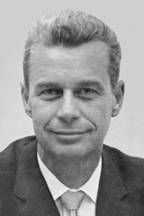
Dr. Michael Bennett
Growth prompts opening of St. Petersburg/Gibbs Campus
Upon President Reed's death in 1944, Vice President Roland Wakefield took his place. While serving as SPJC's president, Wakefield became president of the Florida Association of Colleges and Universities. He retired from the college in 1950 and was replaced by SPJC's Dean of Men, Michael Bennett. During his tenure, which lasted until his retirement in 1977, Dr. Bennett served on numerous state and national boards including as president of the Southern Association of Junior Colleges and as secretary of the Commission on Higher Education for the Southern Association of Colleges and Schools.
In 1965, the predominately African-American Gibbs Junior College merged with St. Petersburg Junior College under Dr. Bennett's leadership. Also that year, a new campus on Drew Street opened in Clearwater. By 1970, SPJC classes also were offered at an SPJC Center in Tarpon Springs.
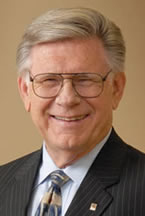
Dr. Carl M. Kuttler, Jr.
Dr. Carl Kuttler, Jr., President 1978-2009
Dr. Carl M. Kuttler, Jr., SPC’s fifth and longest-serving president, was appointed to lead the institution upon Dr. William Bennett's retirement in 1978. He served at the helm of SPC for 31 years and oversaw one of its most transformative periods of growth — moving the College from a two to four-year institution and adding several new sites.
Among his achievements, he worked with lawmakers to craft a bill, which was approved by the Florida Legislature in 2001, to allow then St. Petersburg Junior College (SPJC) to become the first two-year college in the state to offer bachelor’s degree. The College simultaneously changed its name.
Dr. Kuttler oversaw the openings of the Seminole Campus, the Downtown, Allstate and Health Education centers as well as the Dr. Cecil Keene Learning Center in South St. Petersburg. He also partnered with Pinellas County government to purchase and share the EpiCenter, a modern, multi-story building located in Clearwater.
In addition, Dr. Kuttler established a partnership with the University of Florida that brought a College of Pharmacy and a Dental School to SPC’s Seminole Campus. He established the Leepa-Rattner Museum for modern art on the Tarpon Springs Campus. The museum and its contents are the result of an initial donation of fine arts worth millions of dollars from Alan and Isabelle Leepa. With the acquisition of the Palladium Theater as a gift from a nonprofit organization, SPC also became a hub for the local arts community.
Dr. Kuttler received numerous awards for his achievements, including the Outstanding CEO (College President) by the American Association of Community College Trustees and the James L. Wattenbarger Award from the Florida Association of Community Colleges now called Association of Florida Colleges, among others.
Upon Dr. Kuttler’s retirement in December 2009, Dr. Thomas Furlong, former senior vice president for Baccalaureate Programs and the University Partnership Center, was appointed by the Board of Trustees to serve as interim president during a nationwide presidential search.
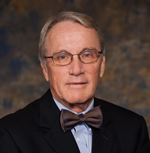
Dr. William D. Law Jr.
Dr. William D. Law, Jr., President 2010-2017
Since his arrival in 2010, Dr. Law's focus was on student achievement, faculty enhancements and workforce education and training. Learn to Earn, a reasonably-priced certificate program for the unemployed or under employed in need of skills enhancement, helped students complete job training in fields such as health care, office work and law enforcement in as little as 10 weeks.
Also under his leadership, SPC's Institute for Strategic Policy Solutions opened on the Seminole Campus. The institute will have a number of missions, all tied to improving public policy and preparing students for careers in the public sector.
In 2010, the college and Gibbs High School entered into a partnership designed to help raise academic standards at the struggling high school and better prepare its students for college work. SPC offered resources, including facilities and faculty and student tutoring, to Gibbs students.
A Center for Excellence in Teaching and Learning (CETL) was formed in 2010 to help enhance learning opportunities for students and faculty on all campuses.
In 2012, the college started The College Experience, an initiative aimed at preparing students to succeed in their courses and finish what they start.
Dr. Law retired in July 2017.
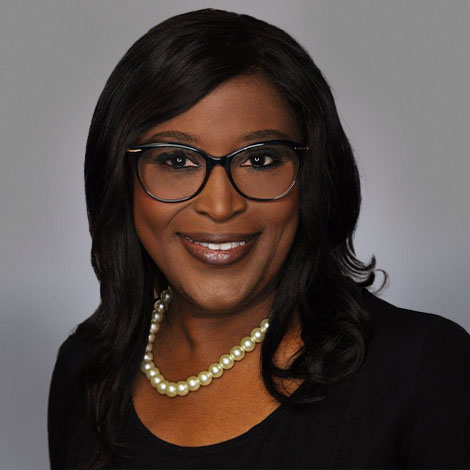
Dr. Tonjua Williams
Tonjua Williams, Ph.D., President 2017-
Dr. Tonjua Williams, Ph.D., a visionary leader dedicated to transforming lives through education and community engagement, became St. Petersburg College’s seventh president on July 2, 2017.
She began her tenure at SPC in 1986 and rose through the ranks in various roles before the District Board of Trustees chose her to take the helm.
Dr. Williams set a new vision for SPC to be widely known as a catalyst for economic growth. Under her leadership, SPC has increased graduation and student retention rates and developed stronger and more strategic partnerships with local businesses, nonprofit organizations and government entities, including BayCare Health System, Jabil, Plasma-Therm, Duke Energy Florida, Bank of America, City of St. Petersburg, Pinellas County Urban League, Pinellas County Schools, the University of South Florida, The Helios Foundation, Honeywell, Lockheed Martin, EEI Manufacturing, and others.
Dr. Willams also led efforts to significantly improve SPC’s fiscal health and align capital assets with college priorities.
Under her watch, the College has secured significant funding to meet industry demands. For example, the College received $7.2 million from the state to develop a SMART Manufacturing Hub at its Midtown Center in south Pinellas. The SMART Hub will provide training in semiconductor technology with smart automation & soldering, generative design using CAD/Autodesk, AI/Machining learning with AWS and Clean Room technology.
Since Dr. Williams took the helm, St. Petersburg College also has attained national recognition. The Chronicle of Higher Education named the College a top producing institution in the Fulbright U.S. Scholar Program for the 2019-20 academic year, making it one of only 26 associate and baccalaureate institutions in the country to receive that recognition. In addition, the most recent U.S. News and World Report rankings list St. Petersburg College as No. 1 in Tampa Bay for Best Online Bachelor’s Programs, Best Online Bachelor’s Programs in Business Programs and Best Online Program for Veterans. The College also joined Florida's list of public colleges and universities in the top 100 in the nation for online bachelor's programs. SPC has received Best of the Best awards in 2023 and previous years from the Tampa Bay Times for Best Local College and Best Nursing College.
Dr. Williams has earned numerous awards and recognition for her professional and community work, including for the fifth consecutive year, being named to the Tampa Bay Business Journal Power 100 List.
Decades of academic and community investment
The above initiatives are some of the more recent ones established at SPC. Over the years, the college has invested its resources in the Leepa-Rattner Museum of Art on the Tarpon Springs Campus, a Music Center with two Steinway concert grand pianos and a Heissler pipe organ on the St. Petersburg/Gibbs Campus, the Palladium Theater in downtown St. Petersburg, an EpiCenter in Largo with a Collaborative Lab built in partnership with Pinellas County to support higher education and business development, St. Petersburg Collegiate High School and an Early College Program for academically- focused teenagers, a University Partnership Center that offers baccalaureate, master's and doctor's degrees from 15 universities in Florida and across America, state-of-the-art classroom technology at all nine learning sites, online learning opportunities, inter-collegiate sports for men and women, and advanced education and training for faculty and staff including travel opportunities.
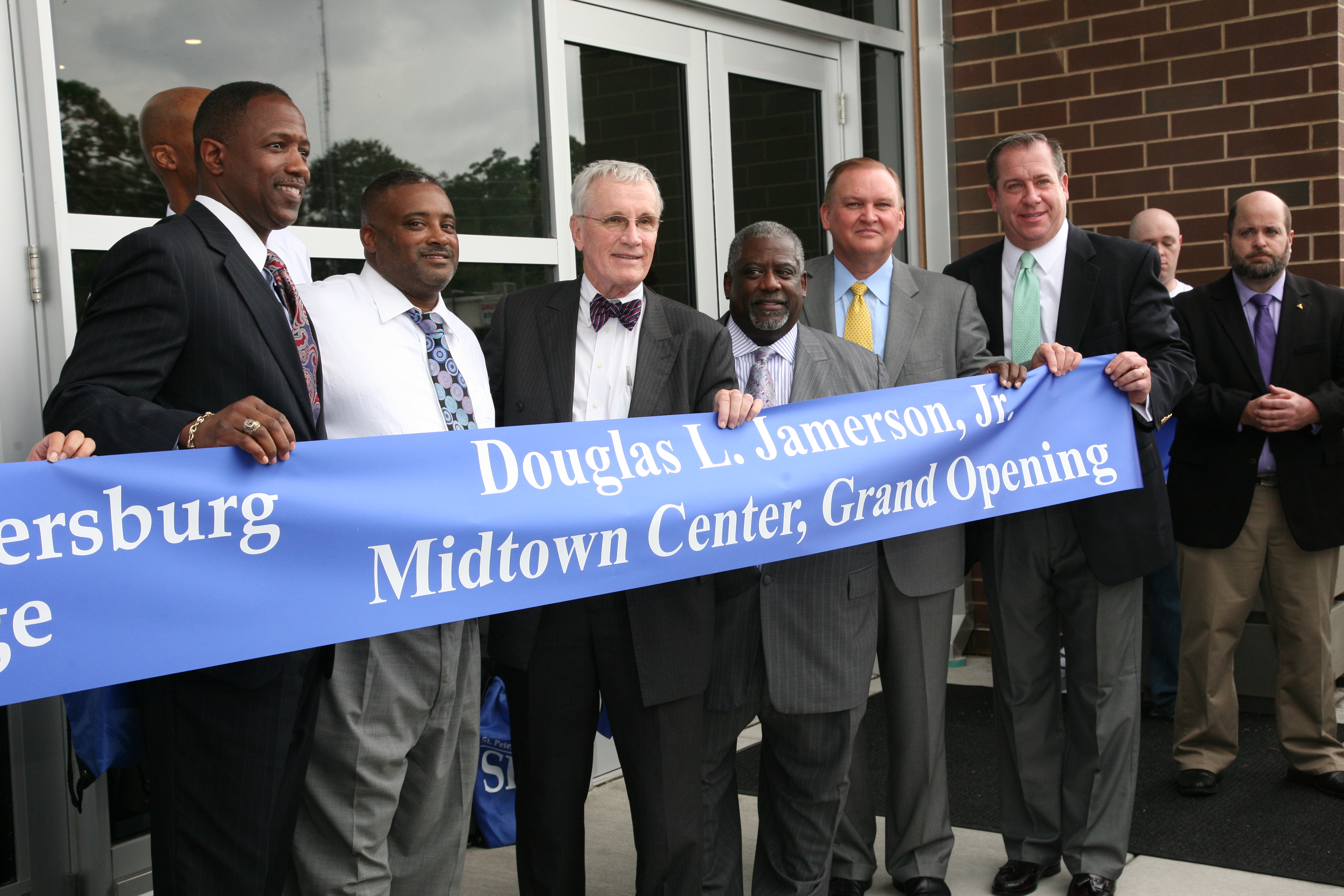
Douglas R. Jamerson Midtown Center
In 2015, SPC opened the new 49,000-square-foot, state-of-the-art campus located in the heart of St. Petersburg's historic Midtown neighborhood. The new center expands on the educational opportunities previously housed in the original 10,000-square-foot facility that opened in 2003 just blocks from the new center. Graphic art installations tell the story of the rich history of Midtown and 22nd Street - affectionately nicknamed "The Deuces."
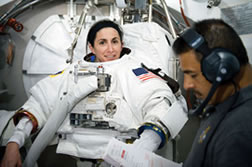
Alumna Nicole Stott participates in an Extravehicular Mobility Unit (EMU) spacesuit fit check.
Notable alumni
Among the school's more prominent alumni are two NASA astronauts, Nicole Stott and Samuel Durrance; Bob Carroll, a writer and creator of the I Love Lucy television show; aquanaut Sylvia Earle; movie actress Carroll Baker; rock musician Jim Morrison of The Doors; Wendell Ware, a creator and leader in the development of microfilm, microfiche and ultra fiche; Howard Johnson, who played on the New York Mets World Championship team; Lobo (Roland Kent Lavoie), pop singer; David Muse, who played flute and sax with Firefall and the Marshall Tucker Band; numerous authors; artists; judges; lawyers; political leaders; and local and national business and civic leaders.
St. Petersburg College continues its long tradition of excellence wrought by dedicated faculty and visionary leadership. Affordable, accredited and comprehensive in its offerings, SPC continues to be responsive to community needs and committed to student success.

